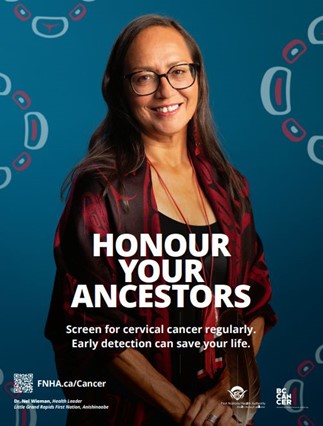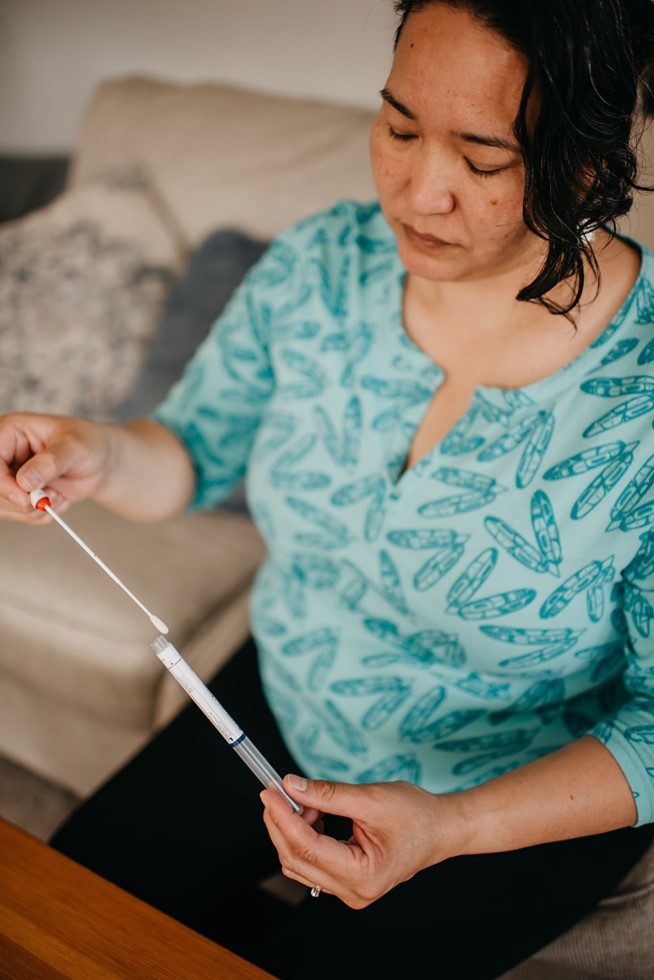Protect against HPV
Did you know there's a common virus called HPV (Human Papillomavirus) that can lead to cancer later in life? The good news is that the HPV vaccine can help protect you from 6 types of cancer.
It Works – When given at a young age, the vaccine is over 95% effective at preventing cancers caused by HPV.
It's safe – Over 200 million doses have been safely given worldwide.
It's free – In BC, the HPV vaccine is free for youth starting in Grade 6.
It's for all genders – The HPV vaccine offers protection for everyone, including women, men, Two-Spirit, and gender-diverse people.
Winner – Short story (written)Lily David – Now I KnowWinner – Visual arts (digital)
Serenity Little – In This Together
Winner – Short story (written)
Connie Paul – Thunderbird & the Virus
Winner – Poetry
Connie Paul – To My Sons
Winner – Visual arts (drawing)
Michael Serroul – Spirit Butterfly
Common questions about the HPV vaccine
About HPV
What is HPV?
How common is HPV?
How serious is HPV?
How is it spread?
HPV stands for human papillomavirus, and is a common infection that can cause six types of cancers. This includes cancers of the throat and neck, cervix, penis, anus, vulva and vagina. All genders and communities can be impacted by cancers caused by HPV.
HPV is very common. Around 3 out of 4 people are likely to get HPV at some point in their lives if they are not vaccinated.
HPV causes around 630,000 cancer diagnoses around the world each year. In BC, thousands of people get illnesses caused by HPV every year. Among First Nations people, cervical cancer caused by HPV was the 5th most diagnosed cancer between 2008-2017. Not all HPV infections lead to cancer, but some do and can cause a lot of harm to affected individuals.
HPV can be passed through close skin-to-skin contact and sexual activity.
About the vaccine
What is the HPV vaccine?
Are HPV vaccines safe?
How well does the HPV vaccine work?
Why is the HPV vaccine given at a young age?
The HPV vaccine is highly effective at preventing six types of cancer caused by HPV. It also protects against infections that cause genital warts.
The HPV vaccine is safe. More than 200 million doses of the HPV vaccine have been given safely worldwide. There is over 15 years of data to support the vaccine’s safety.
When given at a young age, studies show the HPV vaccine is over 95% effective at preventing infection of the most common types of HPV that can cause cervical cancer, other cancers and genital warts.
The HPV vaccine is over 95% effective when given at a young age. Young people build better immunity and are protected before they get exposed to the virus. Even if you missed getting the HPV vaccine when you were young, getting it as an adult still provides crucial protection against cancers caused by HPV.
Getting the vaccine
-
Who can get the HPV vaccine?
-
Where can I get the vaccine?
-
Can't remember if you or your child got the HPV vaccine?
The HPV vaccine is free for individuals ages 9-26. The HPV vaccine is for everyone and offers protection for all genders. Getting the HPV vaccine when you're young protects against many cancers later in life.
The HPV vaccine is also provided free to individuals 27-45 years of age who are:
- HIV positive
- Two-Spirit, transgender or non-binary
- Males who have sex with males, including those who may not yet be sexually active and are questioning their sexual orientation.
- Males who are street-involved
The HPV vaccine is also provided free to individuals who have received treatment for abnormal cells on their cervix.
To be eligible for the HPV vaccine, this treatment must have taken place after a colposcopy. The treatment must have taken place on or after July 31, 2025.
The HPV vaccine is offered in-school to students starting in grade six.
If your child or someone you know misses it, they can get the vaccine at community health centres, local clinics and pharmacies.
Check your
immunization records to see if you’ve received the HPV vaccine or contact your health care provider.
Getting the HPV vaccine is an important part of your physical, mental, emotional and spiritual wellness.
Taking care of yourself and others through regular health checks, good wellness practices and seeking cultural supports can also help.
Start a conversation with your health care provider on ways to prevent cancers caused by HPV.
Don't know who your health care provider is or looking for support?
Cervical cancer screening
Cervical cancer screening is an important part of health care for people who have a cervix. Screening means checking for disease before there are symptoms when it is usually easier to treat.

|

|
There are two options for cervical cancer screening:
Cervix self-screening test
Cervix self-screening is a new way to screen for cervical cancer that can be done wherever you feel safe and comfortable, such as in your home or at a health care provider's office. It is recommended for people with a cervix between 25-69 years of age every five years if negative for HPV.
Call 1-877-702-6566 or visit screeningbc.ca/cervix to request a kit in the mail. You can also connect with a health care provider about picking up a test kit.
Pap smear/test
Pap tests can be done by a doctor, nurse practitioner, registered nurse, midwife or naturopathic doctor at their office or clinic. They are recommended to people with a cervix between 25-69 years of age every three years.
Call 1-800-739-7367 or visit screeningbc.ca/cervix to find a health care clinic that accepts patients for Pap tests.
Resources

